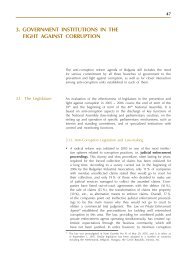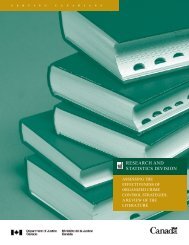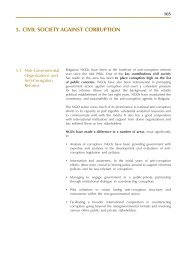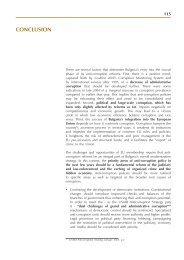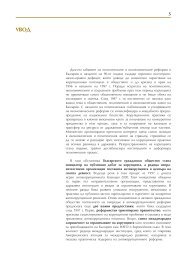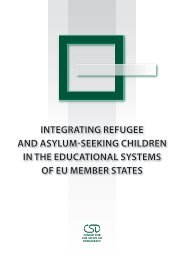National Threat Assessment 2008. Organised Crime - Politie
National Threat Assessment 2008. Organised Crime - Politie
National Threat Assessment 2008. Organised Crime - Politie
You also want an ePaper? Increase the reach of your titles
YUMPU automatically turns print PDFs into web optimized ePapers that Google loves.
Professionals’ right of non-disclosure also gives criminals the opportunity to use<br />
professionals to their advantage in order to conceal the results of their criminal<br />
actions. The third-party accounts that some professionals have at their disposal<br />
by operation of law are a good example. These accounts are used for client’s<br />
financial transactions, which thereby fall under the right of non-disclosure.<br />
Professionals can be obliged to disclose transactions performed via third-party<br />
accounts, but only in highly exceptional cases. In practice, enforcement agencies<br />
almost always decide against the difficult procedure to obtain information about<br />
transactions via these accounts. This makes investigations into criminal cash<br />
flows that run via a third-party account almost impossible.<br />
Because of the introduction of market forces into the independent professions<br />
the service providers in question are also forced to compete with their fellow<br />
professionals. As a result of this competition, service providers who are not as<br />
successful at operating on a free market may run into financial problems after a<br />
while, and it speaks for itself that financial problems can make a service provider<br />
vulnerable to criminal influences.<br />
Legislation<br />
As a whole, the laws and regulations in the Netherlands include various<br />
possibilities for designing legal financial constructions that can also be used to<br />
conceal or siphon off unlawfully obtained funds. It is therefore difficult for law<br />
enforcement officials to separate the legal from the illegal. The ‘legally permitted<br />
lack of transparency’ makes it possible to launder large sums of money without<br />
being noticed, which means that this lack of transparency can be considered<br />
a factor that promotes crime.<br />
Factors that limit crime<br />
Effective legislation<br />
The entry into force of the Public Administration (Probity Screening) Act has<br />
provided municipalities with an instrument to block the exploitation of property<br />
and businesses that require a permit, on the basis of indications that the<br />
applicant is involved in criminal activities. This creates a barrier against criminal<br />
activities, and this can be a relatively effective weapon in the hands of the<br />
authorities. Its effectiveness can be illustrated, for example, by displacement<br />
effects, whereby criminal investments occur less regularly in municipalities where<br />
the Act is used effectively. Criminals focus their attention more on municipalities<br />
where the Act is not (yet) being used effectively. They also shift their attention<br />
abroad. In addition, the Disclosure of Unusual Transactions Act and the<br />
Identification (Provision of Services) Act may have a limiting effect on the role<br />
of the Netherlands as an international transit country for criminal proceeds.<br />
138 <strong>National</strong> <strong>Threat</strong> <strong>Assessment</strong> 2008 – <strong>Organised</strong> crime



